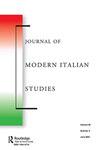一个左翼政党是如何跟不上时代的
IF 0.7
3区 历史学
Q1 HISTORY
引用次数: 0
摘要
一个政党,尤其是进步政党,怎么会不了解和接受时代的重大变化呢?本文检视意大利民主党(Partito Democratico)的经验。自2007年成立以来,该党未能在其明确的创建“新国家党”的目标方面取得令人满意的结果。虽然该党经常加入联合政府,但其选举支持和公民积极参与其活动的情况明显下降。这篇文章的主要论点是,目前P.D.的危机是由于缺乏理解——几乎是拒绝——近几十年来发生的两大政治变化:政治的个性化和社会的数字化。该党拒绝在这些领域进行可能的政治创新,这一点非常明显。这里有一个重要的矛盾:一股政治力量,鉴于其在政治光谱上的地位,本应展望未来,却以极大的怀疑看待现在。这一立场已成为许多欧洲左翼政党的典型立场,这些政党根植于长期的政治传统,但却发现越来越难以理解社会是如何变化的。RIASSUNTOCome può不参与政治,不参与进步,不参与政治,不参与政治,不参与政治,不参与政治,不参与政治,不参与政治,不参与政治,不参与政治。意大利民主党党报(P.D.)。2007年1月,达拉水基金会将“非è国家参与方”定义为“国家参与方”,并将“国家参与方”定义为“国家参与方”。Sebbene将作为政府联合政党的代表进入政府联合政党,并通过è注册管理机构登记参加政府联合政党的活动,以确定政府联合政党的活动,以及政府联合政党的活动。从政治的角度看,从政治的角度看,从政治的角度看,从个人的角度看,从政治的角度看,从数字化的角度看,从社会的角度看,从个人的角度看,从政治的角度看,从社会的角度看,从政治的角度看。我将继续努力,以促进政治创新的可能性。我将继续努力,以促进政治创新。这句话的意思是:“你的力量是政治,你的力量是政治,你的力量是政治,你的力量是政治,你的力量是未来,你的力量是未来。”È una posizione che è在传统政治中激进的人是在欧洲,在传统政治中激进的人是在数据中激进的人,在传统政治中激进的人是在数据中激进的人,在传统政治中激进的人是在数据中激进的人是在数据中激进的人是在数据中激进的人是在数据中激进的人是在数据中激进的人是在数据中激进的人是在数据中激进的人是在社会中变革的人。关键词:政党;政治领袖;个人化;数字化;CHIAVE:政党政治领袖;政治人物;第十一届基督教民主大会,1969年6月29日,罗马,五月宫;也见Maria Letizia Coen Cagli, Luciano d 'Andrea, Marco Montefalcone, Aldo Moro的著作和演讲选集,罗马,acadedemia di Studi Aldo Moro,第30.2页。马里奥·特隆蒂,“贝尼代托十六世,父亲在一个' era nonsua '”,《福格里奥》,2023.3年1月5日。J. Horowitz,“撼动意大利政治的女人”,《纽约时报》,2023.4年3月4日。Chiara De Micheli的演讲,晚邮报,晚邮报。2023年1月11日。其他信息撰稿人说明fortunato Musella fortunato Musella是那不勒斯费德里科二世大学政治学正教授。他是费代丽卡网络学习创新和远程教育传播中心的主任。他还是费德里科二世公共管理学院(SPM)的学习活动校长代表和董事会成员。他目前是国家项目“民主政府:个性化对当代政治制度的影响”(PRIN 2020-2023)的首席研究员,并为PNRR, CN1 -国家高性能计算,大数据和量子计算中心做出贡献。他是Il Mulino出版的第一本开放获取期刊《Rivista di Digital Politics》的编辑委员会成员。他的主要研究兴趣包括政府、政党、概念分析和数字政治研究。他最近的出版物包括政党政治之外的政治领袖(Palgrave 2018),意大利的州长。《宪法与国家政治概论》(2019年1月1日编),孔蒂·切夫。《政治科学手册》(与M. Calise和T.J. Lowi合著,Il Mulino, 2021),《民主政府》(De Gruyter, 2022)。他与毛罗·卡利斯(Mauro Calise)合著了《数字原则》(Il Principe digitale)一书,研究了数字技术在政治中带来的变化。本文章由计算机程序翻译,如有差异,请以英文原文为准。
How a left-wing political party fails to keep up with the times
ABSTRACTHow can a political party, especially a progressive one, fail to understand and embrace the major changes of its time? The article examines the experience of the Italian Partito Democratico (Democratic Party [P.D.]). Since its foundation in 2007, the party has failed to achieve satisfactory results with regard to its explicit objective of creating a ‘new national party’. Although the party has often joined coalition governments, there has been a marked decline in its electoral support and in the active participation of citizens in its activities. The main thesis of the article is that the current crisis of the P.D. is due to a lack of understanding – almost a rejection – of the two main political changes that have occurred in recent decades: the personalization of politics and the digitalization of society. The party’s refusal to embrace possible political innovations in these areas has been very clear. There is an important paradox here: the fact that a political force which, given its position on the political spectrum, should be looking to the future, instead views the present with great suspicion. This is a position that has become typical of many European left-wing parties, which are well rooted in long-standing political traditions, but are finding it increasingly difficult to understand how societies are changing.RIASSUNTOCome può un partito politico, soprattutto se progressista, non riuscire a comprendere e ad abbracciare i grandi cambiamenti del suo tempo? L’articolo esamina l’esperienza del Partito Democratico (P.D.) italiano. Dalla sua fondazione nel 2007, il partito non è riuscito a raggiungere risultati soddisfacenti rispetto al suo obiettivo esplicito di creare un “nuovo partito nazionale”. Sebbene il partito sia spesso entrato a far parte di governi di coalizione, si è registrato un netto calo del suo sostegno elettorale e della partecipazione attiva dei cittadini alle sue attività. La tesi principale dell’articolo è che l’attuale crisi del P.D. sia dovuta a una mancata comprensione - quasi un rifiuto - dei due principali cambiamenti politici avvenuti negli ultimi decenni: la personalizzazione della politica e la digitalizzazione della società. Il rifiuto del partito di abbracciare le possibili innovazioni politiche in questi ambiti è stato molto chiaro. Si tratta di un paradosso molto significativo: una forza politica che, data la sua posizione nello spettro politico, dovrebbe guardare al futuro, guarda al presente con grande sospetto. È una posizione che è diventata tipica di molti partiti di sinistra europei, ben radicati in tradizioni politiche di lunga data, ma che fanno sempre più fatica a capire come le società si stiano trasformando.KEYWORDS: political partiespolitical leaderspersonalizationdigitalizationPAROLE CHIAVE: partiti politicileader politicipersonalizzazionedigitalizzazionePartito Democratico (P.D.)cultura politica Disclosure StatementNo potential conflict of interest was reported by the authors.Notes1. Discorso all’Xi Congresso della Democrazia Cristiana, 29 June 1969, Roma, Edizioni Cinque Lune; also in Maria Letizia Coen Cagli, Luciano d’Andrea, Marco Montefalcone, An Anthology of Aldo Moro’s Writings and Speeches, Roma, Accademia di Studi Storici Aldo Moro, p. 30.2. Mario Tronti, ‘Benedetto XVI, Papa in un’era non sua’, Il Foglio, 5 January 2023.3. J. Horowitz, ‘The woman shaking up Italian politics’, New York Times, 4 March 2023.4. Chiara De Micheli’s speech, Corriere della Sera, corriere.it, 11 January 2023.Additional informationNotes on contributorsFortunato MusellaFortunato Musella is Full Professor of Political Science at the University of Naples Federico II. He is Director of the Federica Web Learning Centre for Innovation and the Dissemination of Distance Learning. He is also the Rector’s Delegate for Learning Activities and a member of the Board of the Federico II School of Public Management (SPM). He is currently Principal Investigator for the national project ‘Monocratic Government: The Impact of Personalisation on Contemporary Political Regimes’ (PRIN 2020-2023), and he contributes to the PNRR, CN1 – National Centre for HPC, Big data and Quantum Computing. He is a member of the editorial board of the Rivista di Digital Politics, the first open access journal published by Il Mulino. His main research interests include the study of government, political parties, conceptual analysis and digital politics. His recent publications include Political Leaders beyond Party Politics (Palgrave 2018), Il Governo in Italia. Profili Costituzionali e Dinamiche Politiche (ed. Il Mulino 2019), Concetti Chiave. Manuale di Scienza Politica (with M. Calise and T.J. Lowi, Il Mulino, 2021), Monocratic Government (De Gruyter 2022). Together with Mauro Calise, he is the author of Il Principe digitale (Laterza 2019), a study of the changes brought about by digital technologies in politics.
求助全文
通过发布文献求助,成功后即可免费获取论文全文。
去求助
来源期刊

Journal of Modern Italian Studies
Multiple-
CiteScore
1.00
自引率
25.00%
发文量
66
期刊介绍:
The Journal of Modern Italian Studies (JMIS) is the leading English language forum for debate and discussion on modern Italy. This peer-reviewed journal publishes five issues a year, each containing scholarly articles, book reviews and review essays relating to the political, economic, cultural, and social history of modern Italy from 1700 to the present. Many issues are thematically organized and the JMIS is especially committed to promoting the study of modern and contemporary Italy in international and comparative contexts. As well as specialists and researchers, the JMIS addresses teachers, educators and all those with an interest in contemporary Italy and its history.
 求助内容:
求助内容: 应助结果提醒方式:
应助结果提醒方式:


